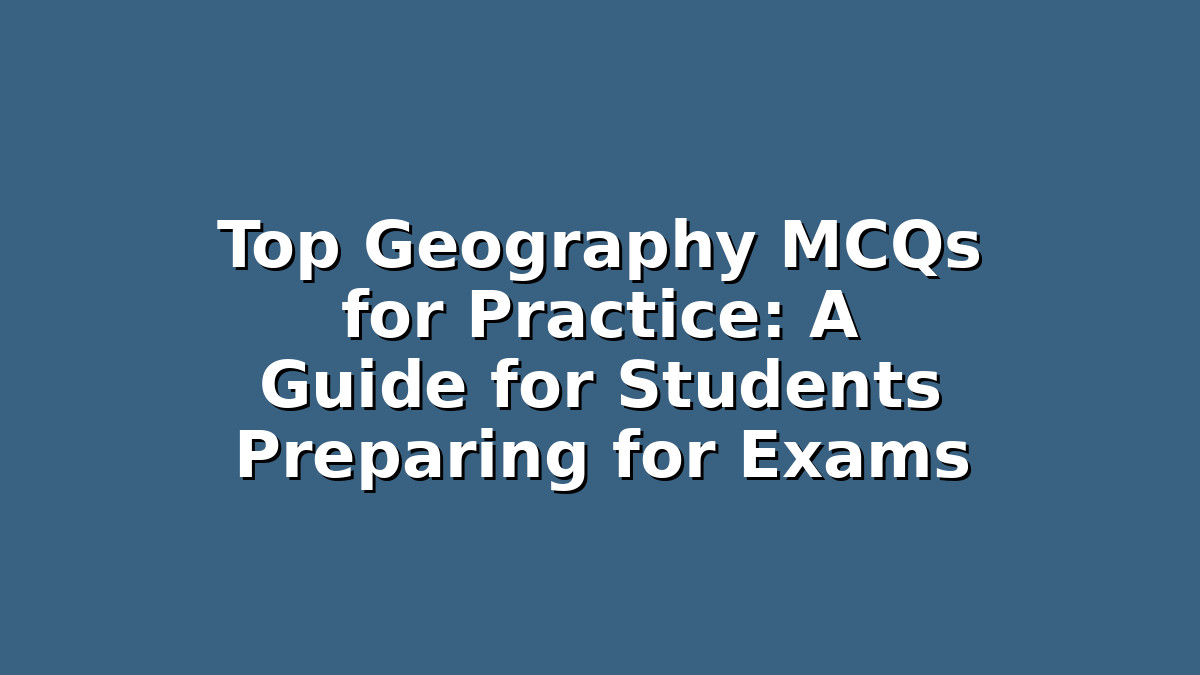Geography is a fascinating subject that helps students understand the world around them—from physical landscapes and climate patterns to human populations and cultural diversity. For students preparing for exams, mastering geography concepts is essential, and multiple-choice questions (MCQs) are a popular and effective way to test one’s knowledge. Practicing well-crafted geography MCQs not only reinforces learning but also boosts confidence and exam readiness.
In this article, we will explore some top geography MCQs for practice, share effective study tips tailored for geography students, and explain how you can maximize your preparation to score well in exams. Whether you are studying for school tests, competitive exams, or national-level assessments, this guide will support your learning journey with advice and examples that sharpen your skills.
Section 1: Why Practice Geography MCQs?
MCQs are a common exam format across many education boards and competitive exams because they test both factual knowledge and quick thinking. Here’s why practicing geography MCQs is beneficial:
– Reinforces Key Concepts: Geography covers a wide range of topics such as physical geography, human geography, environmental issues, and map reading. MCQs help reinforce these concepts by challenging you to recall specific facts and apply understanding.
– Improves Speed and Accuracy: Time management is crucial during exams. Regular practice with MCQs boosts your ability to quickly analyze questions and choose the correct options without second-guessing.
– Identifies Knowledge Gaps: When you answer MCQs, you immediately know which areas you understand well and which need more attention. This targeted feedback helps optimize your study plan.
– Builds Confidence: Familiarity with the exam question format reduces anxiety. Practicing MCQs repeatedly can make exam day feel less intimidating and more manageable.
For example, a common physical geography MCQ might be:
*Which of the following is the longest river in the world?*
A) Amazon
B) Nile
C) Yangtze
D) Mississippi
Knowing the correct answer (B) Nile after repeated practice helps cement this fact in your memory.
Section 2: Top Geography MCQs for Practice and How to Use Them Effectively
Here are some sample MCQs categorized by key geography topics, along with tips on how to approach them during your study sessions.
#### Physical Geography MCQs
1. *Which layer of the Earth is liquid?*
A) Crust
B) Mantle
C) Outer core
D) Inner core
Answer: C) Outer core
2. *What type of rock is formed from molten lava?*
A) Sedimentary
B) Igneous
C) Metamorphic
D) Fossiliferous
Answer: B) Igneous
Study Tip: When practicing physical geography questions, draw diagrams alongside your answers—for instance, sketch the Earth’s layers or rock cycle. Visual aids enhance memory retention.
#### Human Geography MCQs
1. *Which continent has the highest population density?*
A) Asia
B) Europe
C) Africa
D) South America
Answer: B) Europe
2. *What is the term for the movement of people from rural to urban areas?*
A) Immigration
B) Urbanization
C) Emigration
D) Colonization
Answer: B) Urbanization
Study Tip: Relate human geography concepts to real-world examples. For instance, think about urbanization in your own country or cities you know to deepen understanding.
#### Environmental Geography MCQs
1. *Which gas is the major contributor to the greenhouse effect?*
A) Oxygen
B) Carbon dioxide
C) Nitrogen
D) Argon
Answer: B) Carbon dioxide
2. *Deforestation primarily leads to:*
A) Increased biodiversity
B) Soil erosion
C) Formation of glaciers
D) Decreased carbon emissions
Answer: B) Soil erosion
Study Tip: Stay updated on current environmental issues such as climate change, pollution, and sustainable development. Linking MCQs to current events makes the subject more relevant and interesting.
Section 3: Study Tips to Ace Your Geography MCQ Exams
To get the most from your geography MCQ practice, incorporate these proven study strategies:
1. Create a Study Schedule: Break down your syllabus into manageable sections and schedule MCQ practice sessions accordingly. Consistency is key—daily or alternate-day practice is more effective than cramming.
2. Use Quality Study Material: Choose MCQ books, online quizzes, and educational apps from reliable sources. Official textbooks and past exam papers often contain questions that reflect exam patterns accurately.
3. Understand, Don’t Memorize: While memorization is sometimes necessary, aim to understand the underlying concepts. This helps you tackle tricky questions that require application rather than recall.
4. Take Timed Practice Tests: Simulate exam conditions by answering MCQs within a set time. This builds your speed and exam temperament, helping reduce stress during the actual test.
5. Review Mistakes Thoroughly: Every wrong answer is an opportunity to learn. Analyze why you made a mistake and revisit the topic until you feel confident.
6. Join Study Groups: Discussing questions with peers can provide new perspectives and clarify doubts. Group study sessions also keep you motivated.
7. Use Mnemonics and Visual Tools: To remember facts like mountain ranges, rivers, or climate zones, use mnemonic devices or create flashcards and mind maps. Visual tools enhance recall.
Conclusion
Preparing for geography exams can be both enjoyable and rewarding if you use the right tools and strategies. Practicing top geography MCQs offers a dynamic way to enhance your knowledge, improve exam techniques, and build confidence. Remember, consistency and understanding are your best allies in exam preparation.
Start by incorporating MCQs into your daily study routine, focus equally on physical, human, and environmental geography, and use the study tips shared in this article to refine your approach. With dedication and smart practice, you’ll find geography not only easier to master but also more exciting as you discover the world’s wonders.
Good luck with your exam preparation! Keep practicing, stay curious, and watch your geography skills soar.

Responses